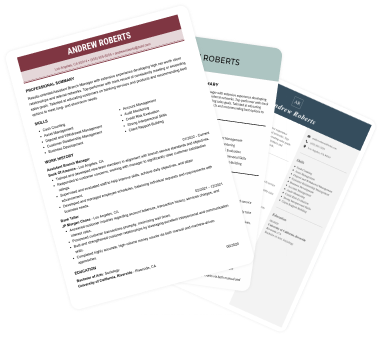Create a professional CV now!
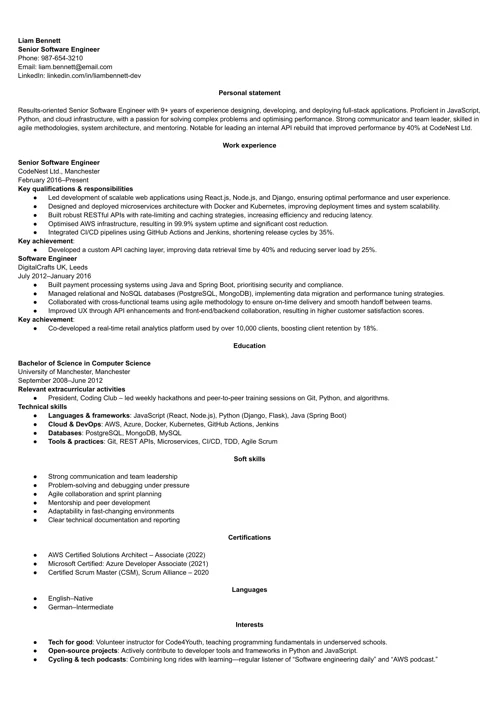 NO
NO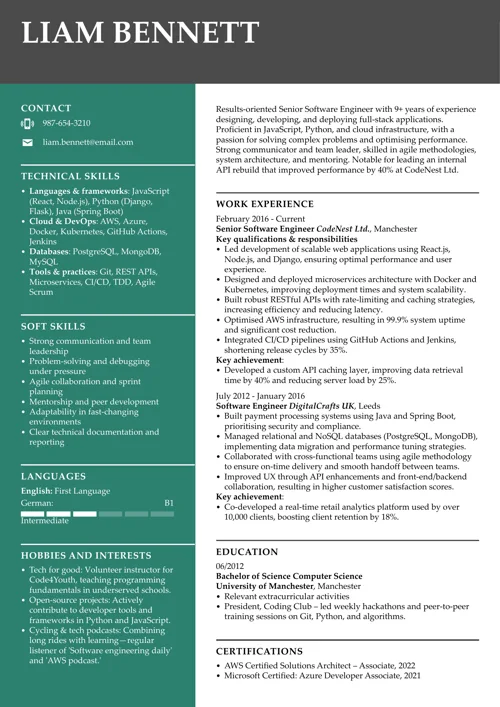 YES
YESLast updated on 29 December, 2025
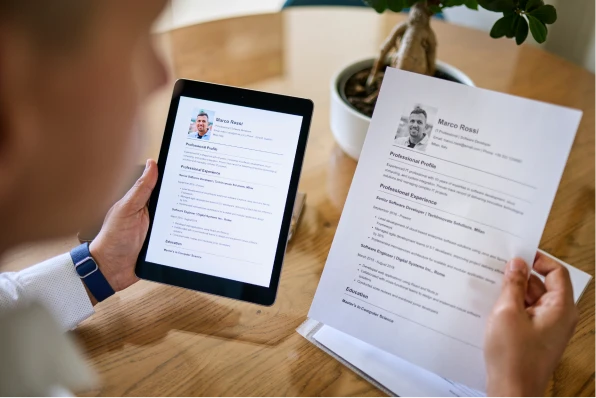
Our customers have been hired by*:
Today, employers place greater emphasis on hard skills, particularly in fast-growing fields like IT, data analysis, and digital marketing. They seek candidates who can contribute immediately with technical expertise to make a measurable impact.
Whether you're looking to upgrade your CV or switch careers, mastering important hard skills can give you a real edge. In this guide, we’ll go over some key hard skills examples to focus on and share tips for showcasing them in your job applications. Let’s jump in!
Create an effective CV in minutes. Choose a professional CV template and fill in every section of your CV in a flash using ready-made content and expert tips.
Create a professional CV now!
 NO
NO YES
YESWe created the sample on the left using our builder. See other good CV examples like this one.
Hard skills are technical abilities required for performing specific tasks or professional roles. They’re tangible and measurable, often acquired through formal education, training, or hands-on experience. Hard skills play a critical role in showcasing your technical competency for a job. Employers seek hard skills on CVs, job applications, and interviews, and may expect that you validate your qualifications with certifications, tests, or portfolio samples.
Let’s clarify the difference between these two types of skills.
Hard skills are specific, teachable abilities that are easy to measure. These include technical competencies such as using software, coding, analysing data, or understanding financial regulations. You typically acquire hard skills through formal education, training programs, or hands-on experience.
Soft skills, on the other hand, are interpersonal and behavioural traits that affect how you interact and work with others. These include fluent communication, problem-solving, adaptability, effective teamwork, and leadership. Soft skills are shaped more by personal experience and are often harder to quantify.
For instance, a financial analyst’s hard skills might include expertise in financial modelling and data visualisation tools, while their soft skills might encompass effective communication to present findings to stakeholders and collaboration with cross-functional teams.
Both types of skills are essential—hard skills help you do the job, while soft skills help you work effectively with others. A strong balance of both is what employers are really looking for.
The UK is dealing with a serious shortage of hard skills, particularly in areas that require a high level of technical expertise, such as AI and digital transformation. If you’re trying to stand out in today’s job market, picking up AI-related skills can set you apart.
If you’re already in the digital field, you’re in a great spot—AI skills are in huge demand, and getting comfortable with them will make you a key player on any team.
Let’s have a look at the key hard skills examples:
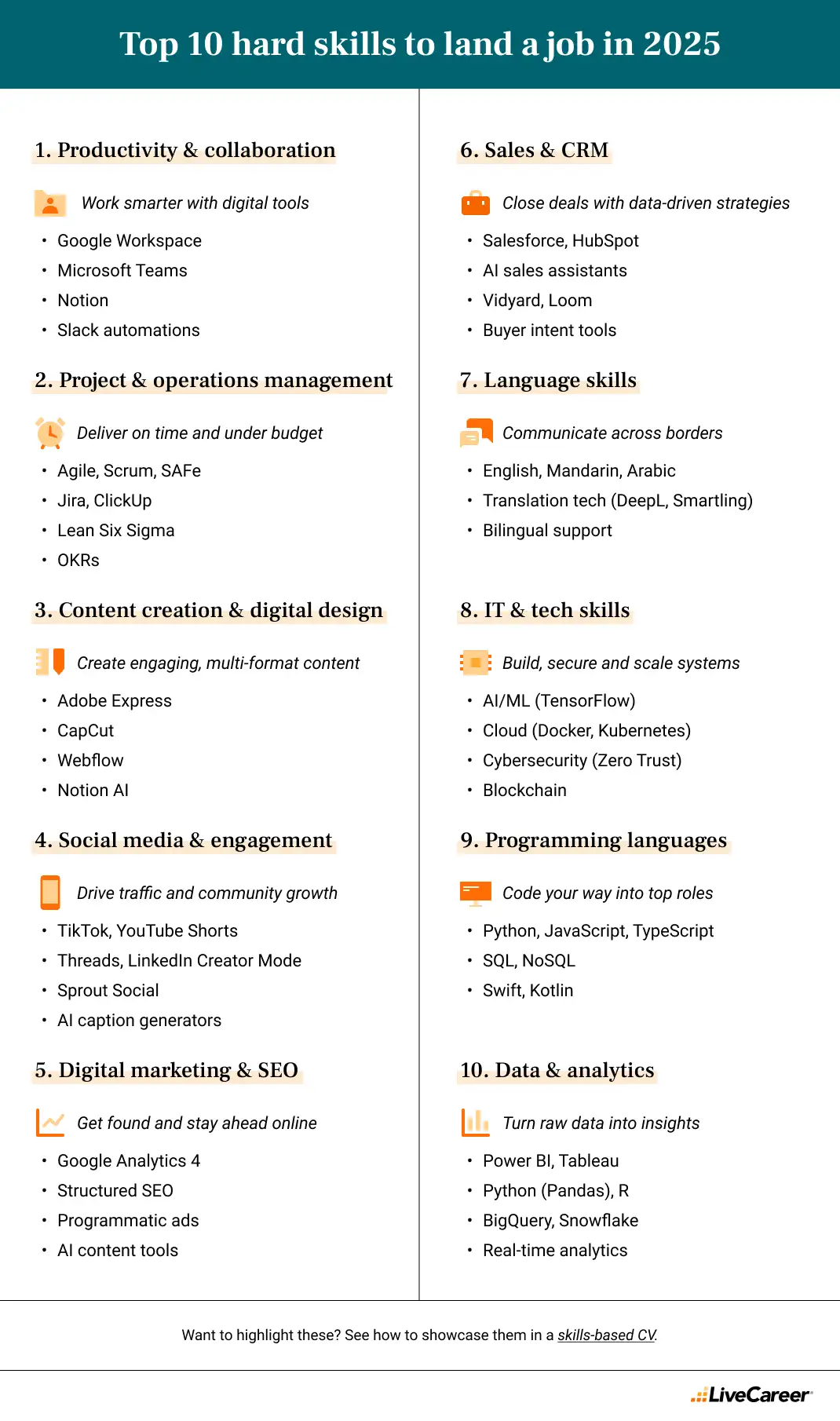
Modern workplaces run on digital collaboration. Proficiency in productivity software ensures efficient task management, seamless communication, and smooth project execution. Whether you're managing tasks, communicating with colleagues, or organising workflows, employers expect you to be proficient with widely used platforms.
Tools include:
Being good at operations and project management means you can help a team stay organised, hit deadlines, and stick to the budget. These skills are typically required in leadership roles and include the ability to oversee processes, manage resources, monitor risks, and ensure quality outcomes through structured methodologies.
Key skills and tools include:
Content is a core part of brand building, marketing, and customer engagement. Proficiency in writing, visual design, and content production tools is key in roles ranging from marketing to media production. These hard skills indicate creative ability and technical proficiency.
Key skills and tools include:
With social media driving visibility and consumer behaviour, professionals need hard skills to manage digital presence, analyse performance, and automate campaigns. These are measurable, tool-based skills that drive traffic, engagement, and sales.
Key skills and tools include:
Digital marketing brings together a range of technical proficiencies needed to attract and retain customers online. These include optimising content for search engines, managing paid advertising, and analysing campaign performance using various tools.
Key skills and tools include:
Modern sales roles demand more than persuasion—they require technical expertise such as the knowledge of CRM systems, data-driven lead generation, and structured sales methodologies. These skills help identify customer needs, optimise the sales pipeline, and close deals more effectively.
Key skills and tools include:
Of course, languages are perfect examples of hard skills. In today’s interconnected world, they are still highly sought after and definitely should make the list of top 10 hard skills. They command their own section at the bottom of a CV—more about that later.
In-demand languages:
As broad as IT might be, most of the time, all of these technical skills are in demand. According to LinkedIn, in 2024, 4 out of the top 5 most in-demand hard skills were related to IT. This trend highlights how essential tech proficiency has become across nearly every industry, from finance to healthcare to education.
Key skills include:
Coding is practically a world of only hard skills. Here are the most popular programming languages that could adorn your CV based on your employer’s requirements. Mastering even one of these languages can boost your job prospects, especially as more industries rely on software solutions to drive innovation and efficiency.
Top programming languages include:
For more guidance, read our guides on IT skills and computer skills.
In today’s world, data is everywhere—every decision, every action, every interaction generates valuable information. But raw data is meaningless without someone to interpret it. If you have the ability to analyse and make sense of complex data, your expertise will be in high demand and highly rewarded.
Key skills include:
The structure of your CV may vary depending on your experience, industry, and specific needs (check out our industry-specific guides for tailored advice). However, the fundamental answer to the question, “How do I write a CV?” remains straightforward and universal: focus on effectively demonstrating your hard skills to make an impact.
Every perfect CV begins with a strong CV personal statement, also known as a CV summary. While it might feel daunting to condense your value into just six lines, this section is your chance to stand out. Use it to immediately showcase your most impressive hard skills and achievements. Remember, many recruiters won’t read beyond this section if it doesn’t grab their attention.
Results-oriented Senior Software Engineer with 9+ years of experience designing, developing, and deploying full-stack applications. Proficient in JavaScript, Python, and cloud infrastructure, with a passion for solving complex problems and optimising performance. Strong communicator and team leader, skilled in agile methodologies, system architecture, and mentoring. Notable for leading an internal API rebuild that improved performance by 40% at CodeNest Ltd.
A strong CV summary will convince the recruiter you’re the perfect candidate. Save time and choose a ready-made personal statement written by career experts and adjust it to your needs in the LiveCareer CV builder.
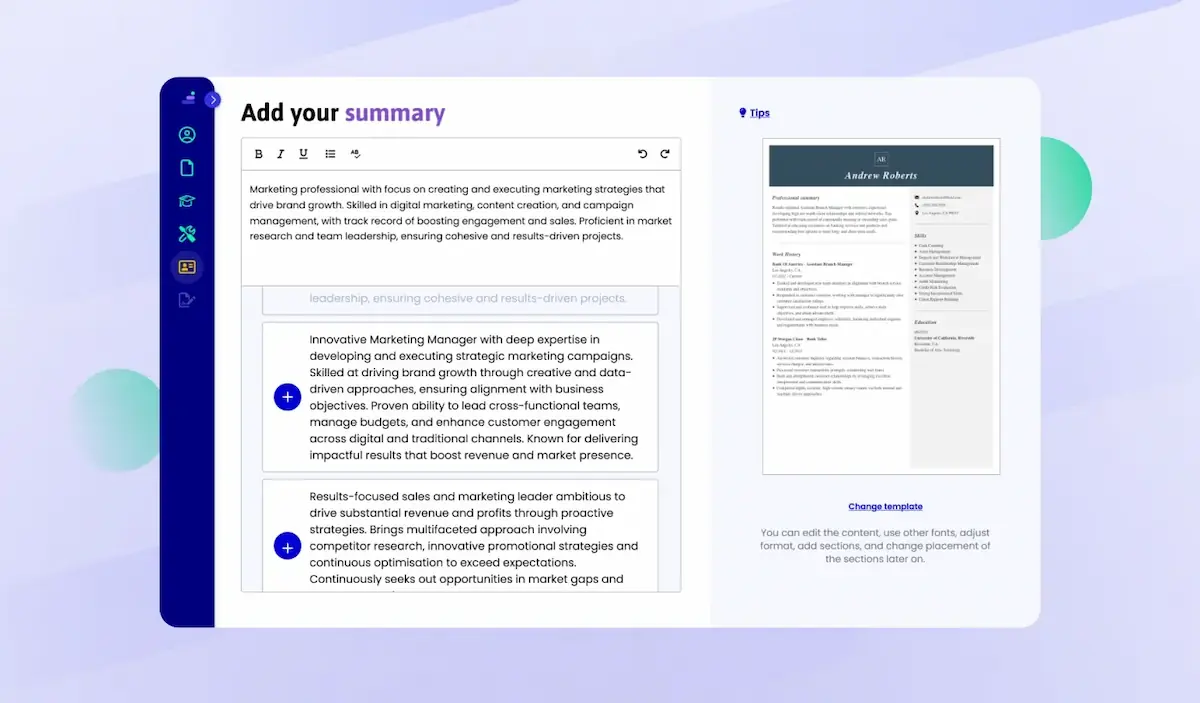
Your work experience section shouldn’t just list what you were responsible for—it should show how your background directly fits what the employer is looking for. Think of it as a tailored snapshot of your most relevant accomplishments, aligned with the skills and results the role demands.
Here are some CV tips to make your work experience stand out:
Hard skills examples on a CV: work experience
Senior Software Engineer
CodeNest Ltd., Manchester
February 2016–Present
Key qualifications & responsibilities
If you're a student or have little to no professional experience, your education section should do more than just list your degree. Use it to highlight relevant coursework, academic projects, extracurricular activities, and any tools or software you became familiar with during your studies. This added context can demonstrate your initiative and technical capabilities, helping to offset a lack of work experience.
On the other hand, if you have substantial work experience, keep this section brief—just listing your degree and institution is usually enough.
Hard skills for CV: education section
Bachelor of Science in Computer Science
University of Manchester, Manchester
September 2008–June 2012
Relevant extracurricular activities
Simply squeezing a short list of skills into a side section of your CV isn’t always the best move, especially since that’s what most candidates do. To really make your skills stand out, take a more thoughtful, structured approach.
Reserving a small side section for skills on your CV might not be the best approach, especially since it’s so common. Here’s how you can stand out:
Hard skills in the skills section
Technical skills
Soft skills
Before jumping into personal interests like yoga, make sure you’ve clearly listed any additional hard skills in their own sections. List languages, certificates, and awards clearly under their own headings. They are all extremely useful hard skills to mention. Then include hobbies and interests to round out the final section of your CV.
Examples of hard skills on a CV: additional sections
tutaj
Certifications
Languages
Interests
Improving your hard skills involves a focused and consistent approach to learning and practice. Here’s how to work on improving your hard skills:
Start by pinpointing the exact hard skill you want to improve, e.g., programming, writing, graphic design, or proficiency in software like Excel or Photoshop. Be specific and instead of saying “I want to improve in tech,” identify “Python programming” or “data visualisation using Excel.” Clarity helps focus your learning efforts and select the most effective resources.
Select trustworthy and structured learning materials. Online platforms like Coursera, Udemy, edX, and LinkedIn Learning offer courses taught by industry professionals. Books, official documentation, and tutorials from credible sources can also be helpful. When possible, look for resources that provide hands-on practice, assessments, and certification to validate your learning.
Create specific and achievable goals to guide your learning process. Use the SMART framework—make sure your goals are Specific, Measurable, Achievable, Relevant, and Time-bound. For example, “Complete an intermediate Excel course and build a financial model within one month” is more actionable than “Get better at Excel.” Clear goals help keep you motivated and accountable.
Repetition is essential for mastering hard skills. Make time for regular practice, ideally through real-world tasks or personal projects. If you're learning coding, build small applications; if it's a language skill, write essays or reports. Active application helps reinforce concepts and improves your ability to use the skill in different situations.
Constructive feedback is vital for improvement. Share your work with mentors, experienced peers, or online communities like GitHub, Behance, or Stack Overflow, depending on the skill. Be open to critiques and use them to fine-tune your approach. Feedback reveals blind spots and can accelerate your learning by highlighting areas that need more attention.
Hard skills often change with advancements in technology and industry practices. To stay relevant, follow blogs, podcasts, YouTube channels, or industry news related to your field. Subscribe to newsletters, attend webinars, or join professional groups to stay informed about updates, trends, and emerging tools.
You don’t have to be a CV writing expert. In the LiveCareer CV builder you’ll find ready-made content for every industry and position, which you can then add with a single click.

Listing skills on a CV? Check these guides, too:
Our editorial team has reviewed this article for compliance with LiveCareer’s editorial guidelines. It’s to ensure that our expert advice and recommendations are consistent across all our career guides and align with current CV and cover letter writing standards and trends. We’re trusted by over 10 million job seekers, supporting them on their way to finding their dream job. Each article is preceded by research and scrutiny to ensure our content responds to current market trends and demand.
Category: CV Help
Crafting a job-winning CV is all about showcasing your unique skills and experiences. Start with a strong personal statement that highlights your career goals and achievements.
Try Our CV Builder Now